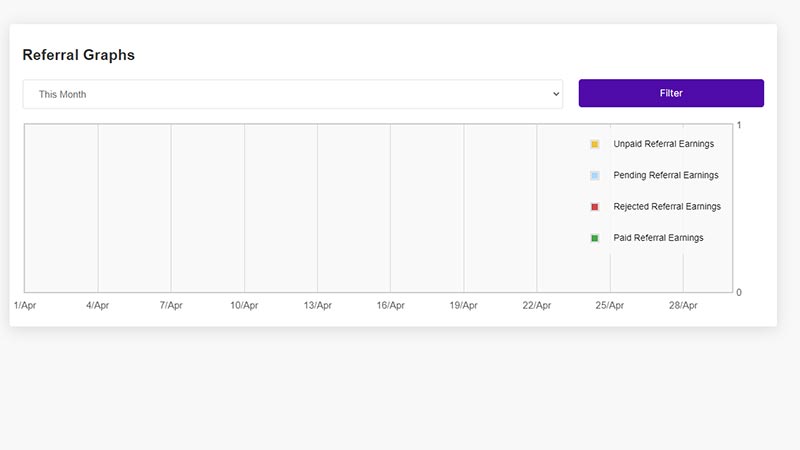Affiliate marketing has emerged as one of the most popular and effective ways for businesses to reach customers and for individuals to earn money online.
It offers a compelling opportunity for businesses to expand their reach and for individuals to generate income online. By leveraging the power of affiliate relationships, businesses can tap into the vast network of affiliates to drive sales and grow their customer base.
Meanwhile, affiliates have the flexibility to monetize their online presence by promoting products or services that resonate with their audience. While affiliate marketing presents its challenges, those who approach it strategically and ethically can unlock its full potential and build sustainable income streams over time.
In this guide, we will understand the concept of Affiliate Marketing tips and how it works.
What is Affiliate Marketing?

Affiliate Marketing is a performance-based marketing strategy where businesses (merchants or advertisers) reward affiliates (publishers or partners) for driving traffic or sales to their products or services through the affiliate’s marketing efforts.
It’s essentially a symbiotic relationship where both parties benefit: the merchant gains exposure and sales, while the affiliate earns commissions for successful referrals. These efforts typically involve content creation, social media promotion, email marketing, and other forms of digital outreach.
Pros of Affiliate Marketing
Affiliate marketing is a game-changer for businesses looking to maximize their marketing efforts without breaking the bank. Here’s why it’s such a great option:
Cost-Effective: First off, it’s super cost-effective. Instead of shelling out a ton of cash upfront for ads that may or may not work, you only pay affiliates when they bring in results, like sales or leads. This makes it perfect for businesses of all sizes, even those starting with a tight budget.
Expanded Reach: You can reach a whole new audience with affiliate partnerships. Affiliates have their own blogs, websites, and social media followings, so you can tap into their networks to get your message out to more people than ever before.
Enhanced Credibility: Affiliate marketing relies on trust and credibility. When affiliates genuinely believe in your product and promote it to their audience, it builds trust and loyalty. This means higher conversion rates and happy customers who keep coming back for more.
Performance Tracking: Affiliate marketing gives you the power to track your performance in real-time. You can see exactly how your campaigns are doing and make adjustments on the fly to get the best results possible.
Diverse Partnerships: You can partner up with all kinds of affiliates, from influencers to bloggers to industry experts. This lets you tailor your marketing to different audiences and niches, so you can really make a splash in the market.
Scalability: One great thing about affiliate marketing is that it can easily grow with your business. As your business expands, you can scale up your affiliate programs by bringing in more affiliates, trying out different promotional tactics, and tapping into new markets. This flexibility means that affiliate marketing can be a reliable long-term strategy for keeping your business on the path to success.
Cons of Affiliate Marketing
Dependency on Affiliates: Relying on affiliates can boost a business’s marketing game, but it also means putting a lot of eggs in one basket. Businesses count on affiliates to push their products and bring in sales. If an affiliate starts slacking or stops promoting, it can hit the business’s bottom line.
Risk of Fraudulent Activity: Affiliate marketing is great for paying based on performance, but it’s also a hotbed for shady stuff like click fraud or affiliate fraud. Some affiliates might try to cheat the system by using sneaky tactics to drive traffic or fake sales. Businesses need to keep a close eye on things to catch any funny business.
Commission Costs: Affiliate marketing can save some cash, but those commission costs can add up. Businesses might end up eating into their profits depending on how much they’re paying out and how profitable they are. Businesses need to crunch the numbers and make sure they’re getting a good return on their investment.
Brand Reputation Risks: Affiliates are like the face of the businesses they promote, so if they start acting sketchy or pushing junk products, it can hurt the brand’s reputation. Businesses need to pick their affiliates wisely and set clear rules to keep their brand looking good.
Management Complexity: Running an affiliate program is no walk in the park. It takes a lot of time, effort, and resources to recruit, train, and manage affiliates. Without good oversight, things can quickly get out of hand.
Saturation and Competition: Finally, let’s not forget about the fierce competition in the affiliate marketing world. With so many businesses and affiliates out there, it can be tough to stand out from the crowd.
How Affiliate Marketing Works?
Joining an Affiliate Program: Affiliates typically join affiliate programs offered by merchants. These programs provide affiliates with unique tracking links or codes to promote the merchant’s products or services.

Promoting Products/Services: Once accepted into an affiliate program, affiliates promote the merchant’s offerings through various marketing channels. This can include creating content (such as blog posts, reviews, and videos), sharing affiliate links on social media, running paid advertising campaigns, or utilizing email marketing.

Tracking Sales/Referrals: Affiliate links contain tracking parameters that help merchants identify which sales or leads originated from specific affiliates. When a customer clicks on an affiliate link and makes a purchase or completes a desired action (such as signing up for a service), the affiliate’s unique identifier is recorded, and the affiliate is credited for the referral.

Earning Commissions: Affiliates earn commissions for successful referrals. The commission structure varies depending on the affiliate program and can be based on a percentage of the sale amount, a fixed amount per sale or lead, or other metrics.

Payment: Affiliates receive payments from the merchant based on the agreed-upon terms, which could be monthly, bi-weekly, or according to other schedules. Payment methods also vary, including direct bank deposits, PayPal transfers, or checks.
Key Concepts of Affiliate Marketing

Affiliate Links: These are unique URLs provided to affiliates for tracking purposes. When a customer clicks on an affiliate link and makes a purchase, the affiliate’s ID is captured, ensuring proper attribution of the sale.
Cookies: To track referrals accurately, affiliate programs often use browser cookies. When a user clicks on an affiliate link, a cookie is stored on their device, recording information such as the affiliate’s ID and the time of the click. This cookie typically has an expiration period, during which the affiliate can still earn a commission if the user makes a purchase.
Conversion Rate: This refers to the percentage of clicks on an affiliate link that results in a desired action, such as a purchase. Affiliates aim to optimize their conversion rates through various strategies like creating compelling content, targeting the right audience, and optimizing the user experience.
Affiliate Networks: These are platforms that connect merchants with affiliates. They provide a centralized marketplace where affiliates can find and join multiple affiliate programs. Popular affiliate networks include ShareASale, CJ Affiliate, and Amazon Associates.
Strategies for Success in Affiliate Marketing

Choose the right niche: Select a niche that aligns with your interests, expertise, and audience preferences. This will make it easier to create engaging content and promote relevant products.
Research affiliate programs: Look for reputable affiliate programs with high-quality products or services that appeal to your target audience. Consider factors like commission rates, cookie duration, and payment terms.
Build a strong online presence: Create a professional website or start a blog to establish credibility and attract visitors. Utilize search engine optimization (SEO) techniques to improve visibility and drive organic traffic to your site.
Produce valuable content: Focus on creating high-quality content that provides value to your audience. This could include product reviews, tutorials, comparison guides, and other informative articles that address their needs and interests.
Promote strategically: Use a variety of promotional channels to reach your audience. These include social media, email marketing, guest blogging, and influencer partnerships. Tailor your promotional efforts to each platform and audience demographic.
Cultivate trust and authenticity: Build trust with your audience by being transparent about your affiliate relationships. In addition, only promote products that you genuinely believe in. Authenticity breeds loyalty and encourages repeat business.
Track and analyze performance: Monitor the performance of your affiliate marketing campaigns using analytics tools. Pay attention to key metrics such as clicks, conversions, and earnings. Besides use this data to optimize your strategies for better results.
Stay updated and adapt: Keep abreast of industry trends, changes in consumer behavior, and updates to affiliate programs. Adapt your strategies accordingly to stay competitive and maximize your earning potential.
Diversify income streams: Explore opportunities to diversify your income beyond affiliate marketing, such as creating and selling your own products, offering consulting services, or monetizing your expertise through online courses or memberships.
Stay persistent and patient: Success in affiliate marketing takes time and effort, so stay committed to your goals and keep refining your strategies as you learn and grow in the field. Be patient and persistent, and you’ll eventually reap the rewards of your hard work.
Key Players in Affiliate Marketing

Affiliate marketing involves multiple parties working together to promote products or services and earn commissions based on sales or leads generated. The key players in affiliate marketing typically include:
Merchant or Retailer: These are the folks who own the products or services being sold. They get affiliates to help promote their stuff in exchange for a cut of the sales or leads.
Affiliates: Also known as a publisher or partner, these are the people or companies who promote the merchant’s products through things like websites, social media, and email newsletters. They get paid for each sale, click, or lead they bring in.
Affiliate Network: These guys act as the go-between for merchants and affiliates. They provide a platform where merchants can list their affiliate programs and where affiliates can find programs to join. They also handle tracking, reporting, and payments. Some examples are ShareASale, CJ Affiliate, and Rakuten Advertising.
Customers: These are the folks who buy products or services through affiliate links. They might not even know they’re part of an affiliate marketing thing!
Tracking and Analytics Platforms: These tools help keep track of how well affiliate marketing campaigns are doing. They show things like clicks, conversions, and how much money is being made. Some examples are Google Analytics and tracking tools from affiliate networks.
Affiliate Managers: Some merchants have folks who manage their affiliate programs. They recruit new affiliates, offer support, and help make sure everything is running smoothly. They’re like the coaches of the affiliate marketing team!
Content Creators and Influencers: They often participate in affiliate marketing by promoting products or services to their audience. They leverage their content and influence to drive traffic and sales for merchants, earning commissions in return.
Challenges and Considerations of Affiliate Marketing.

Competition: The affiliate marketing space is highly competitive, with thousands of affiliates vying for the attention of consumers. To stand out, affiliates need to offer unique value propositions and differentiate themselves from competitors.
Regulatory Compliance: Affiliates need to follow different rules and guidelines, like the FTC guidelines in the US. These guidelines say that affiliates have to be honest about their connections with merchants and describe the products or services they’re promoting.
Dependency on Merchant Programs: Affiliates are reliant on the merchant programs they promote. Changes to commission rates, program terms, or even the discontinuation of a program can significantly impact an affiliate’s earnings.
Managing Relationships: Building and maintaining positive relationships with merchants is essential for long-term success. Effective communication, transparency, and professionalism are key to fostering strong partnerships.
Conclusion
Affiliate marketing offers businesses a powerful means of expanding their reach, driving sales, and building brand credibility through strategic partnerships. Its cost-effective nature, scalability, and performance-driven approach make it an attractive marketing strategy for businesses across industries.
However, affiliate marketing also presents challenges such as dependency on affiliates, fraud risks, and management complexity. By carefully weighing the pros and cons and implementing best practices, businesses can harness the full potential of affiliate marketing to achieve sustainable growth and success in the digital marketplace.
Now over to you,
Do you have any affiliate marketing tips who are new to WordPress?
Is affiliate marketing helping you to earn a side income?
Please let us know your thoughts and follow us on Facebook and Twitter.
